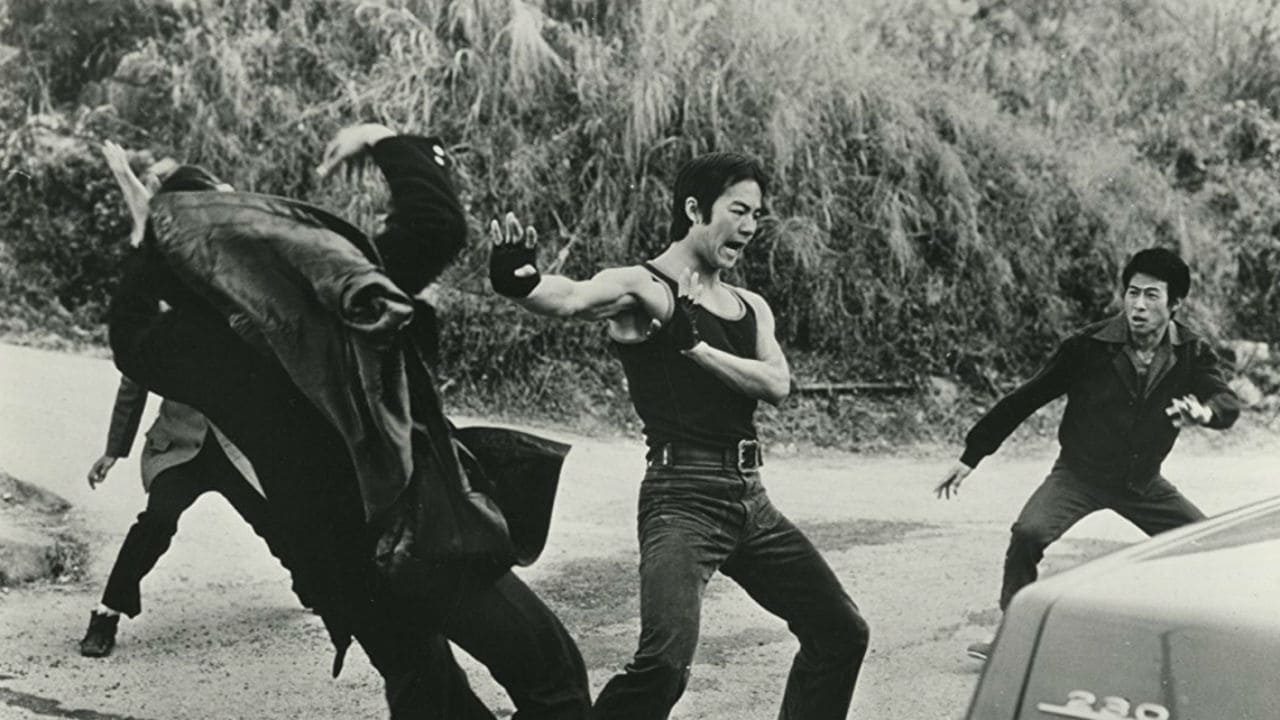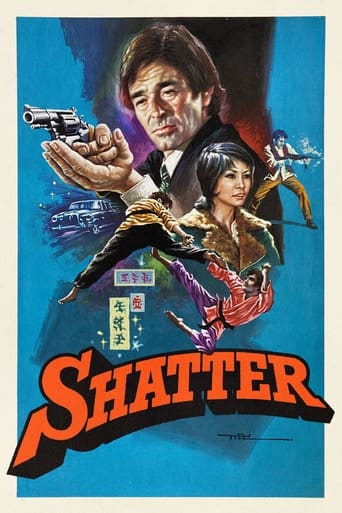



Well Deserved Praise
I'll tell you why so serious
This is a tender, generous movie that likes its characters and presents them as real people, full of flaws and strengths.
View MoreIt's the kind of movie you'll want to see a second time with someone who hasn't seen it yet, to remember what it was like to watch it for the first time.
View More1974's "Call Him Mr. Shatter" was nearly the last gasp for Britain's renowned Hammer Films, followed as it was by only three more titles and a pair of 13 episode teleseries. Second of a two picture deal with Hong Kong's Shaw brothers, preceded by "The Legend of the 7 Golden Vampires," its lone returning cast member being Peter Cushing, in a sad finale to a sterling run at Hammer that began with the 1957 classic "The Curse of Frankenstein" (completing one episode of HAMMER HOUSE OF HORROR in 1980, "The Silent Scream"). Stuart Whitman stars in the title role, that of a professional assassin whose latest successful hit, the president of a (fictitious) African nation, results in his payment deferred by recalcitrant international banker Hans Leber (Anton Diffring). Not keen on losing $100,000, Shatter quickly learns that it was neither the US nor Britain that actually hired him, but the drug syndicate that found the president's lookalike brother a better fit for their nefarious needs. Paul Rattwood (Cushing), British security agent in Hong Kong, advises Shatter to leave or sacrifice his health, but with support from martial artist Tai Pah (Li Tung) and sister Mai-Mee (Lily Li), plays off both Rattwood and Leber for greater financial gain, ultimately left no choice but to remain in Hong Kong for the rest of his life. The opening builds nicely through Cushing's introduction 21 minutes in, then goes into a slumber as over a half hour of staged kung fu fights stops the plot dead in its tracks. The choreography is fine, but none of the blows actually hit their targets, the stunts consisting of men simply leaping or falling (no match for Bruce Lee's authenticity). Any film that requires its audience to root for a professional hit man for hire is asking quite a bit, so its really Cushing's three scenes, and Diffring's solid evil presence that truly keep it from sinking completely. Cushing's cynical character initially comes off as quite villainous and never really shakes that image, even when he come through at the end with Shatter's final remuneration. Despite its reputation, it remains quite watchable, perhaps due more to director Monte Hellman's yeoman efforts, filming roughly 80% of the finished film before being unceremoniously dumped toward the end of shooting by Hammer producer Michael Carreras, who took sole directorial credit (he'd been hired because of his familiarity with the location).
View MoreIn my review of Joseph Losey's THESE ARE THE DAMNED (1963), I had written that Hammer Films' way out of their conventional rut (particularly during the early 1970s) was by recruiting talented film-makers who operated not so much within the mainstream but rather around its edges. Expatriate American Losey was thus an ideal choice to kick-start this intriguing venture (having conveniently relocated to the U.K.) but, while his first effort for the company – the excellent short thriller MAN ON THE BEACH (1956) – adhered reasonably close to the Hammer standard (they were still to gain a reputation for garishly-colored horrors and complexly-plotted chillers), the second (the above-mentioned title) was easily their hardest-to-categorize and most pretentious – if undeniably brilliant – outing...which, I guess, put paid to the notion of their continuing this 'shaky' practice! Still, out of the blue (and when they were probably at their lowest ebb, since the company would basically fold in a couple of years' time!), they made another attempt in this direction by persuading cult American film-maker Monte Hellman to make an action thriller – as part of a current deal with famed Hong Kong producers The Shaw Bros. – for them. Apparently, he had recently undergone an extensive location tour of the Orient for a project that had subsequently fallen through – indeed, he claims he was only approached by Hammer in view of his familiarity with the place (which obviously saved them the time and money another director would have spent there in pre-production)! However, this time around, the subject matter was not congenial – especially since the company were contract-bound to incorporate martial arts sequences by a Bruce Lee wannabe – and, frankly, it all looked pretty desperate from the outset (crossing POINT BLANK {1967} with ENTER THE DRAGON {1973})! To make matters worse, the cost-conscious Shaw Bros. liked to shoot their pictures back-to-back utilizing the same crew so that, by the time they came to the SHATTER lot, they would be all but exhausted! – similarly, star Stuart Whitman (past his prime and haggard-looking) would have started boozing by then and prove just as unfocused on his work! Faced by all this, Hellman unsurprisingly fell behind schedule and, yet, Hammer chief Michael Carreras took it out on him and, three weeks into the shooting, had the director fired, eventually taking over control himself (as he had done on BLOOD FROM THE MUMMY'S TOMB {1971} following original helmer Seth Holt's death) and even got sole credit but it reportedly took him 6 months to finish the picture considering that, by all accounts, some two-thirds of it were already pretty much in the can (actually, Hellman had subsequently refused to edit his footage, so Carreras must not have had an easy time getting the whole to make sense and, frankly, work)! Anyway, Whitman is a hit-man (elaborately utilizing a gun hidden inside a camera for the job) duped into working for the mob to eliminate an African dictator. When he turns up to get paid, the hero is not only given the cold shoulder (by his nefarious contact Anton Diffring) but himself becomes the target of assassination thereafter (these include taking a pot-shot with a bazooka at what is thought to be his hotel room)! Complicating matters further is the vague presence of a sinister/eccentric secret-service official (Hammer stalwart Peter Cushing in his inauspicious last theatrical appearance for the company, though his own personal contribution is dignified as ever). Somehow, Shatter (presumably the protagonist's code-name: his rough manners rendered more prominent by the American retitling CALL HIM MR. SHATTER – complete with a title song better suited to some "Blaxploitation" offering!) befriends a couple of local siblings: he being the Kung-Fu master and she obviously falling for the American tough guy. For no obvious reason, they join him in his crusade to get even with the mob and, even more pointlessly, the Oriental is involved (and naturally emerges victorious) in a martial-arts competition; in the end, the girl dies stopping a bullet meant for Whitman and Cushing (after having had his men beat up Shatter, a 'compliment' our hero later returns!) emerges from the shadows to reveal himself a benign figure after all – with Diffring and the dictator's own brother being fingered as the real villains (who expire in a hilarious joint fall, after being riddled by bullets, through the large glass-pane of the former's office)!Incidentally, the edition of the film I watched includes a couple of censored violent moments (the inserts immediately recognizable from the sudden drop in picture quality) missing from the R1 Anchor Bay DVD. The accompanying Audio Commentary is, however, available and Hellman was certainly a sport in opting to take part: he dutifully points out the scenes he did or did not shoot but readily takes the blame for the film's ultimate lameness (amazingly, it came in-between two of his best-regarded American works i.e. TWO-LANE BLACKTOP {1971} and COCKFIGHTER {1974}, whose own viewing is upcoming in my ongoing Hellman retrospective)! The track proves just as laid-back as the movie itself (incorporating the occasional interjections from a separately-recorded Whitman who seems to be quite fond of it and Hellman, despite apparently bearing a grudge against The Shaw Bros., taking as he does every opportunity to denigrate them!) with moderator Norman Hill (who presumes this may well have been Whitman's last gasp as a leading man, but he was actually still good for another 10 years or so – including the somewhat similar Italian poliziottesco SHADOWS IN AN EMPTY ROOM aka BLAZING MAGNUM {1976}) querying the director about his other work and influences (singling out the outsider protagonists in the films of both John Huston and Carol Reed), and even about his own opinion on Hammer's more typical output (which he tackles in an off-handed, albeit diplomatic, fashion).
View MoreLong unavailable on home vid, this was just one of the many projects that cult maestro Monte Hellman ghost-directed. So when the good folks at Roan decided to release this on LD, I jumped at the chance to get a copy. At forty bucks, it was worth it. But I had to order off the Dollar Menu for the rest of the week.It was a long-held belief that Hellman only directed a small portion of the film before being sacked and replaced by producer Michael Carreras. But in the running commentary, Hellman, upon seeing the movie for the very first time, was surprised to see that at least 80% of the final cut is his.Though no "Background to Danger," this is a very passable B-adventure, with Whitman a fine hero/foil. Whitman's Shatter is another in the long line of Hellman loner-man-on-the-outside-looking-in protagonists. The film also bears striking similarities with the long forgotten "Karate-the Hand of Death" (1961)about an American Karate expert returning to Japan after the war and runs afoul of some mob types. "Shatter" is a decent way to spend an hour and a half on a rainy afternoon, and a find for Monte Hellman completeists.
View MoreKicking, shooting and beating aplenty in this Hammer/Shaw Brothers co-production starring Whitman as a hitman with a conscience. Not much here you haven't seen before, but Whitman is OK, the music is kinda funky and, while he doesn't have much screen time, it's always great to see Peter Cushing.
View More